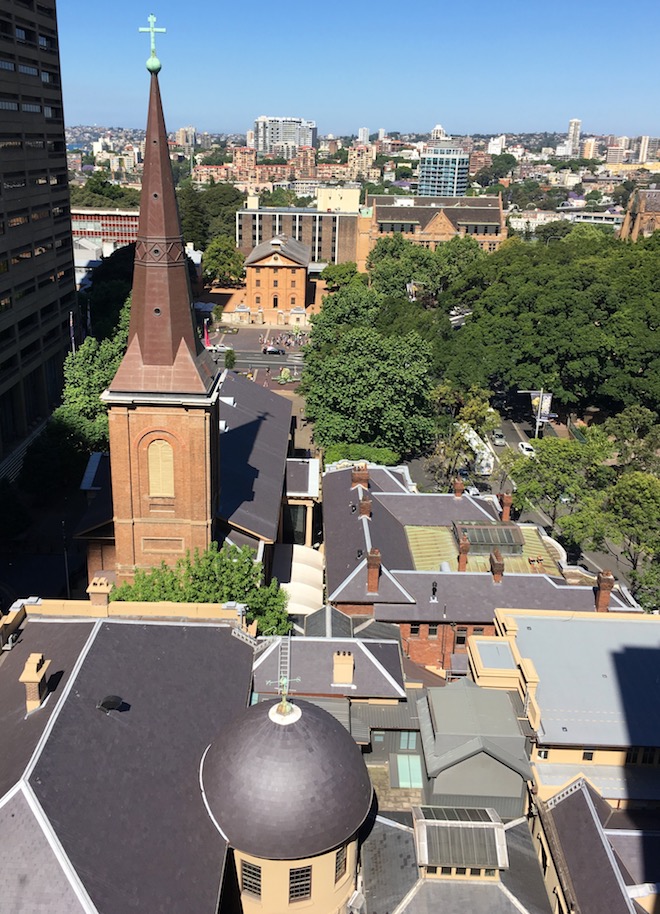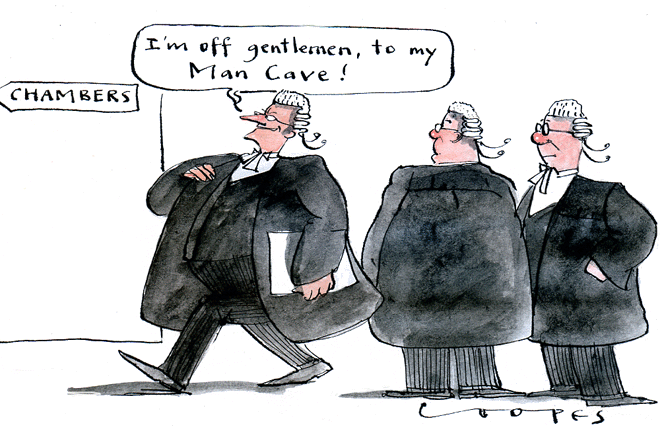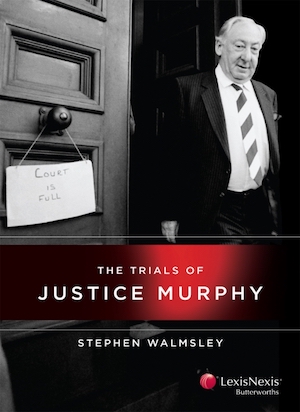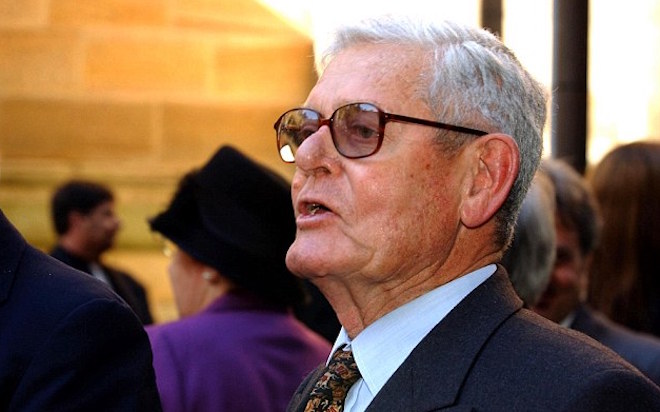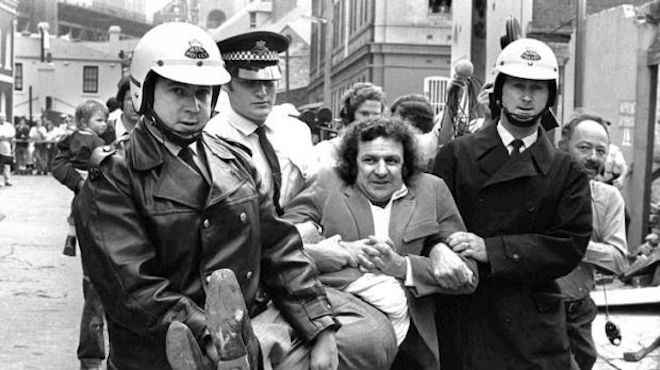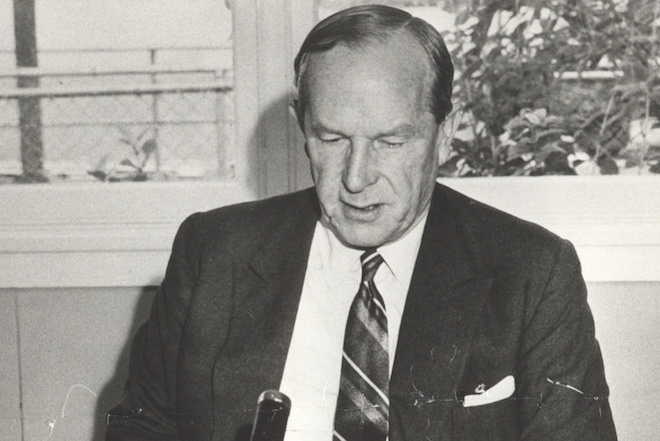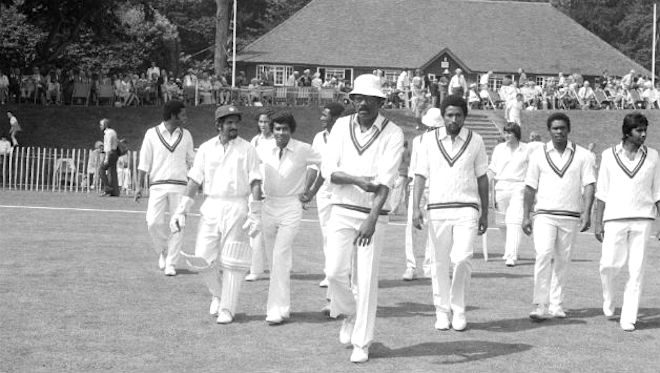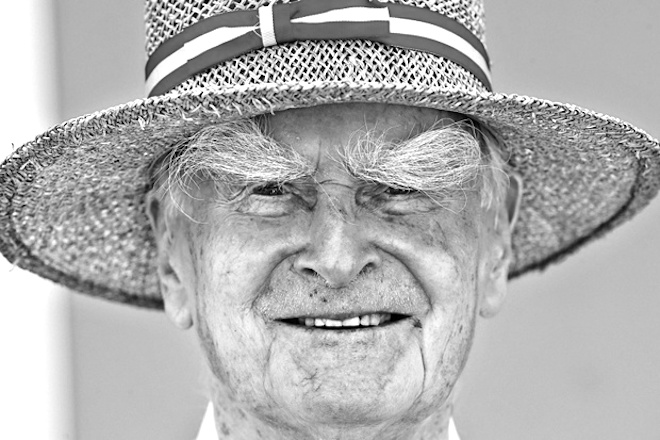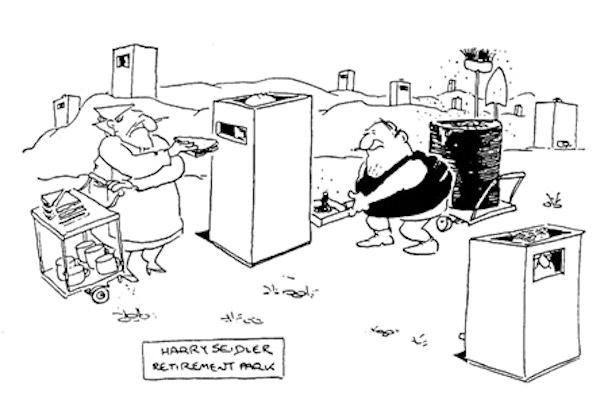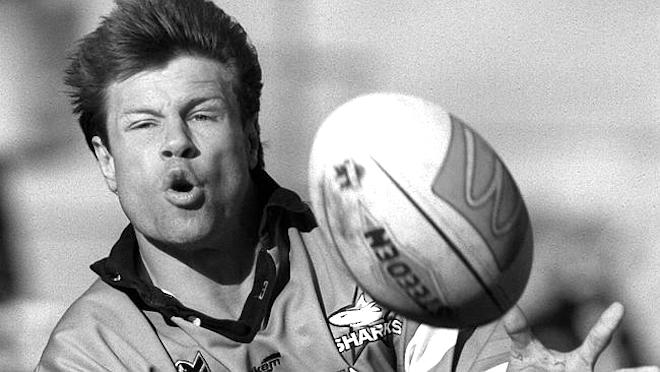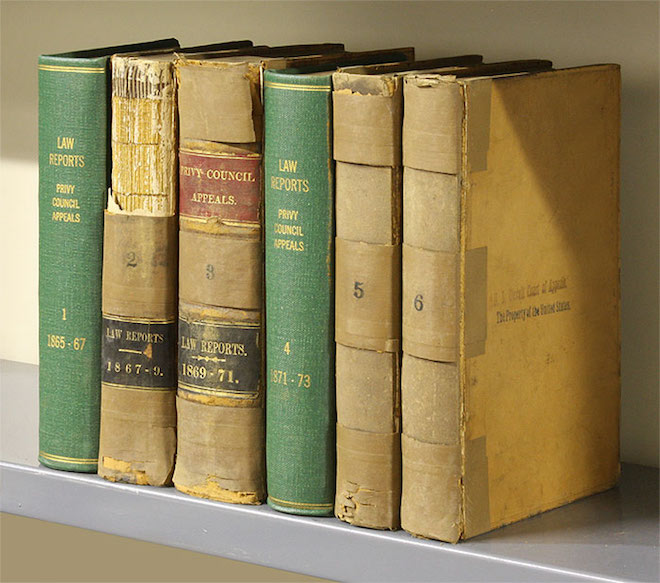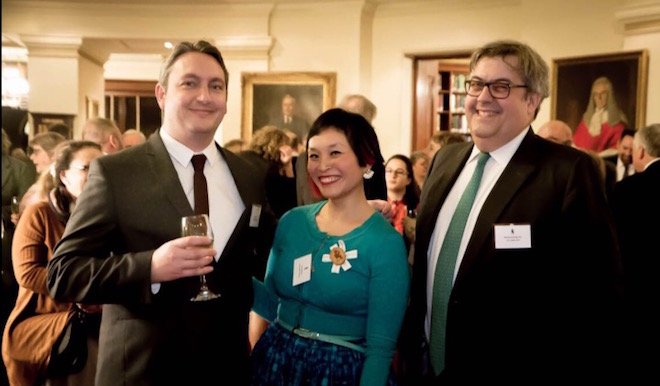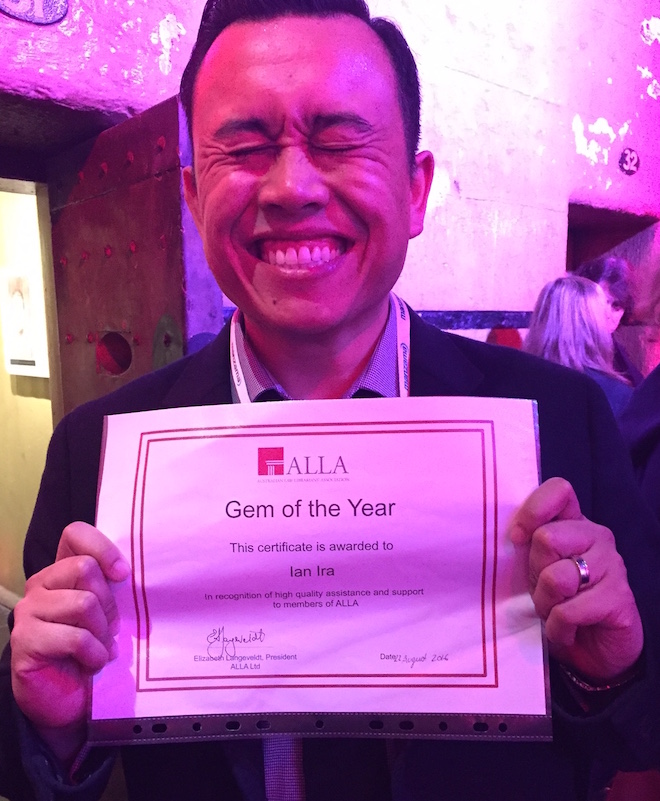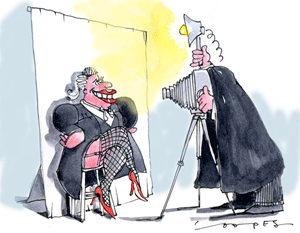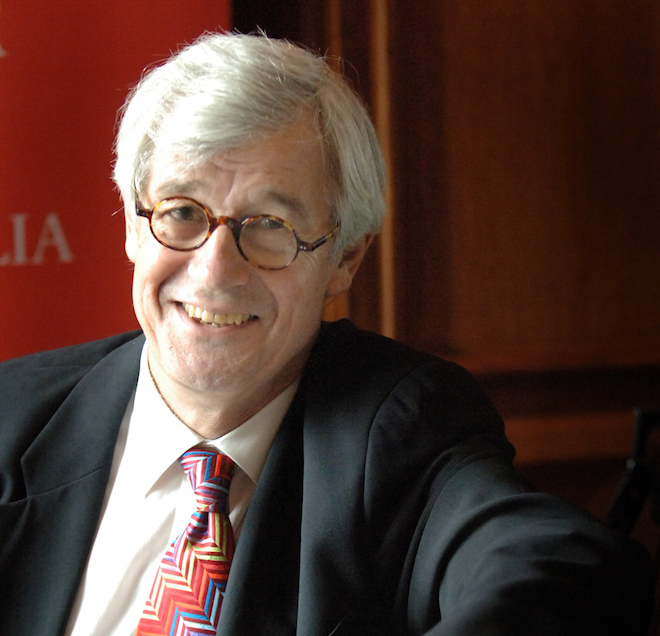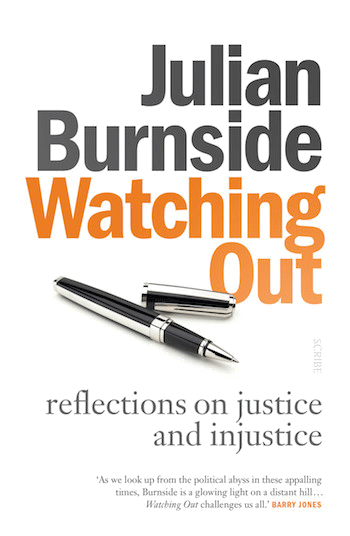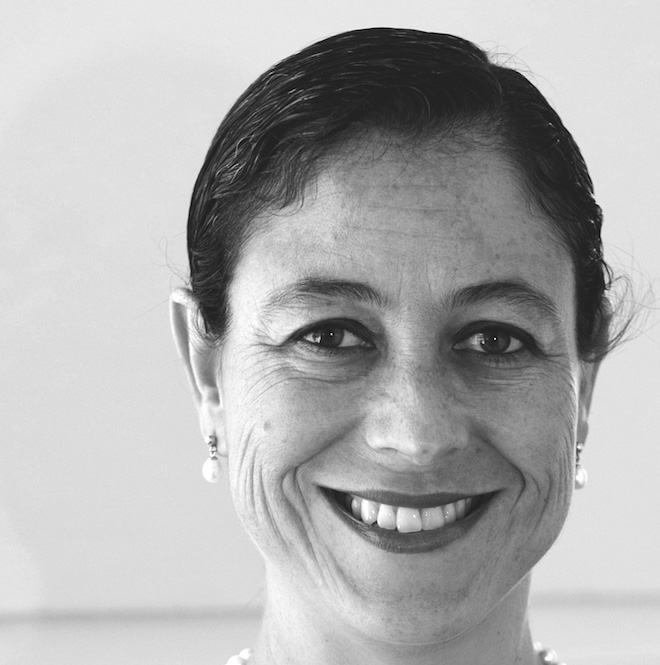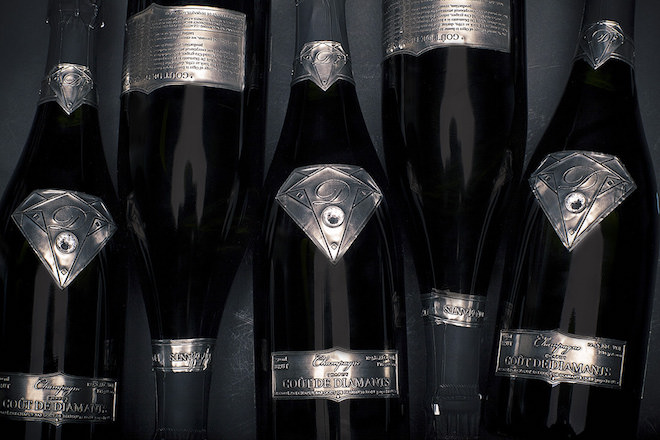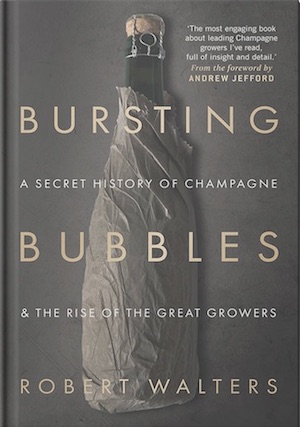In his heyday, Tom Hughes QC had a flourishing defamation practice ... Big publishers and broadcasters ... Celebrities and sportsmen ... Trips to the Privy Council ... All attended by Hughes' trademark flourishes, piercing glares and withering cross-examination ... Ian Hancock in his biography of the great brief delves into Hughes' personal diary for some up close comments on cases, clients, judges and other barristers ... Defamatorium
![]() Hughes: "high, wide and handsome"
Hughes: "high, wide and handsome"
Gorton v ABC; Punch v Fairfax, Lloyd v David Syme, Austin v Daily Mirror, Seidler v Fairfax, Makim v Nationwide News, Carson v Fairfax, Ettingshausen, Rivkin, Mercedes Corby ... what a great sprawling life Tom Hughes QC had at the defamation bar.
In Ian Hancock's biography of Hughes, A Cab on the Rank, it is the defamation cases that take up the bulk of the barrister's courtroom history.
In the process Hancock gives us revealing extracts from Hughes' personal diary and his fee book - insightful asides on judges, barristers and clients, such as:
"I do not enjoy working for Fairfax [emphasis in the original]. What a difference between the close rapport I have with Packer, when I am working for him, and the distanced relationship with the Fairfax people - they are, as I described them in my Punch address last week, a stiff-necked mob."
The happy relationship with the Packer organisation ultimately soured when Hughes' retainer was not renewed.
He wrote that while engaged by Fairfax in a case brought by Labor MP Tom Uren settlement became urgent when Uren entered the courtroom and the jury panel waved and smiled at him. At that point there was nowhere else for the defendant to go but cough-up.
The Sydney Morning Herald in an editorial of April 3, 1975, just before the fall of Saigon, had accused Uren of being a racist and a traitor.
Hughes acted for plenty of politicians and one of the most newsworthy after he left parliament was in 1973, taking up the cudgels for his friend and former prime minister, John Gorton, in an ACT case against the ABC and Max Walsh.
Walsh was interviewed by Richard Carleton on TDT in relation to a developing crisis for the Gorton government, where he effectively accused the PM of dishonesty and falsehood.
It was a big case. Murray Gleeson appeared with Hughes for the plaintiff, Jack Smyth QC for Walsh and J.T. Hyatt QC for the ABC.
In a hearing that went for six days Hughes argued for compensatory and aggravated damages, but the outcome was a disappointment. Justice Russell Fox found only one of the imputations arose and there was "some slur" on the plaintiff's character. He awarded the former PM just $7,500 and half his costs.
Hughes also took a case for the NSW premier, Sir Robin Askin, whom the union official Jack Mundey sued for defamation. Mundey claimed that Askin had described him as "vermin" at a Liberal Party rally and that the unionist favoured violence. There was this exchange in cross-examination:
Hughes: When you say you abhor violence with guns and pick handles ...
Mundey: ... including cricket bats.
Hughes as a minister in the Gorton government had threatened anti-Vietnam war demonstrators outside his home in Bellevue Hill with a cricket bat.
![]() Jack Mundey when the BLF and the greenbans were in their prime
Jack Mundey when the BLF and the greenbans were in their prime
Mundey also told Hughes that Vietnam was a place "where you sent conscripts to die".
The jury found for the defendant and Mundey's appeal was dismissed by Moffitt, Reynolds and Samuels.
There was also the case in which Hughes acted for the NSW National Country Party leader Leon Punch who sued the SMH and AAP in 1979 over what these days seems like a complaint that politicians regularly endure.
It was reported that dairy farmers who were excluded from the milk quota had called for Punch's resignation as leader of the party.
The story was a tip-off came from Opposition leader Neville Wran to reporter Gordon Hunter. There was to be a big meeting of dairy farmers at Bega at which it was expected that there would be a call for Punch to resign as party leader.
Hunter wrote the story in advance of the meeting and as a consequence of internal mishaps at the paper it was not "held" pending verification. Consequently, the published report was full of mistakes.
The case commenced in the Federal Court in Canberra and Hughes opened "high, wide and handsome, which pleased the client and those with me".
Alec Shand appeared for Fairfax before Justice Douglas McGregor, of whom Hughes wrote:
"Really Doug is a nice well-intentioned but blinkered and inept lawyer. As a judge he is as disappointing as he was at the bar. But so well-intentioned."
David Levine described a Hughes-Shand contest as, "gladiatorial advocacy at its best: you know, blood on the wall and one would be down and fight his way up, and the other would do down and fight his way back".
In his closing address Hughes said Fairfax and AAP had adopted "the mask of the cynic ... the cynic with the sneering smile ... an ocker attitude that politicians were there to be knocked... it does not matter what you say about them".
It had emerged during the case that there had been a motion at the Bega meeting, which was defeated, calling for Punch's resignation as leader of the National Country Party.
Hughes also noted that Shand had cross-examined Punch "not very well".
McGregor awarded Punch a total of $27,250 ($18,860 against Fairfax and $8,660 against AAP), accepting Hughes argument that politicians are entitled to equal treatment under defamation law.
The Full Court dismissed an appeal, making the curious observation that it was defamatory to write that a political leader had lost the confidence of a significant number in his party who called for his resignation.
![]() Barwick: very chatty
Barwick: very chatty
One other interesting judicial aside recorded by Hughes in his diary was from a lunch at the Australian Club on August 24, 1979 where Chief Justice Garfield Barwick was "his usual ebullient self & very chatty" and declared that any statement concerning a person and injurious in the sense that it was likely to cause loss, should be actionable, even though it did not reflect on the person's reputation.
Privy Council
There were two famous defamation cases that Hughes took to the Privy Council: Clive Lloyd v The Age and Reg Austin v The Daily Mirror.
The Age, on January 21, 1982, published a piece by an English-born journalist David Thorne about Packer's World Series Cricket. It suggested that the West Indies cricket team, captained by Lloyd, had taken a dive in an earlier match in order to avoid playing Pakistan in the finals, which would have meant crowd numbers, TV ratings, gate revenues and sponsorship would all have been well down.
The better option was to spread the series out to a full five games to maximise the ratings and the revenue.
Hughes who was on a $50,000 a year retainer with Packer's interests took the case for the plaintiff with Michael McHugh QC for the newspaper.
At the trial Hughes was typically high-blown. The allegations were "filthy ... atrocious". It was a "disgraceful piece of journalism". Lloyd had been defamed "in a horrible and horribly serious fashion". It would be difficult "to imagine a more serious libel upon an international cricketer", etc. etc.
McHugh said the article did not name Lloyd, did not defame him and was an honest opinion. The jury awarded damages of $100,000. An unnamed Victorian QC congratulated Hughes: "That will set the smartypants [sic] of Spencer Street back on their heels for a while."
It went to the NSW Court of Appeal, with the majority (Glass and Samuels) finding that the trial judge Colin Begg fell into error when instructing the jury. The article was not defamatory, it was an expression of opinion relating to a matter of public interest and was based on material that was substantially true. The original verdict was set aside and costs awarded against Lloyd.
However, there was no appeal to the Privy Council as of right because Allen Allen & Hemsley for the plaintiff had failed to make the necessary deposits as security for the cost of preparing appeal papers.
Hughes wrote in his diary:
"[It is] a paradigm case of solicitors who, getting too big for their boots, fail to do the work that makes big litigation go ... Everyone wants to be a chief & disdains the necessary work of the Indian."
Hughes asked Bob Alexander QC of the English bar to petition the Privy Council for special leave to appeal. Alexander wrote to Hughes in July 1985 to say he had a good response from the board and that the new Law Lord, Huw Griffiths, who was sitting on the case, said privately that the Court of Appeal's decision was all wrong.
"Please do not tell anyone this," added Alexander.
![]() Clive Lloyd with the West Indies cricket team. Not enough Indians at Allens
Clive Lloyd with the West Indies cricket team. Not enough Indians at Allens
With a date set for the hearing in London Alexander invited Hughes to a buffet supper at Gray's Inn and a function at the House of Lords to mark the opening of the legal year.
At this point Ian McPhee and Ruth McColl were for The Age. Hughes felt that the privy councillors were with him on imputations, but on comment "the going was a little sticky". Because of an interrogatory answer that the defendant did not intend to convey the imputations there was a general feeling that a new trial would be inappropriate.
Hughes wrote:
"When poor Neil McPhee got to the question of identification, they began to get quite short with him. Diplock said he as wasting time; and even the urbane Hugh Griffiths said the argument was an affront to common sense."
On whether the author intended to convey the imputations Hughes said that McPhee had "really lost the place and lapsed into confusion".
It was over quickly with a decision in Lloyd's favour.
During the hearing Griffiths sent a note to Hughes saying how delightful it was to "listen to you". He suggested dinner at the Garrick Club after he returned from a trip to Cyprus. All very chummy.
There was a celebration of three bottles of Moet et Chandon with Bob Alexander and his wife Marie and John Sackar (the junior).
In Austin v Daily Mirror, sports journalist Ron Casey wrote that as a result of Reg Austin's conditioning of the Manly rugby league team it had "gone from being a great side to being a tarred band of former champions". Casey advised the club to sack this "fitness fanatic".
The jury rejected all the defences except qualified privilege and awarded damages of $60,000, subject to Justice Lusher's ruling on QP.
Lusher found that qualified privilege had been made out and that the article consisted mainly of comment based on facts that were substantially true, which seemed to contradict the jury which found that the facts as stated were substantially false.
An appeal was dismissed with costs with a finding that publication of the defamatory matter was reasonable in the circumstances.
Austin would not surrender and took the case to 9 Downing Street (home of the Privy Council), with Hughes for the appellant and Henric Nicholas for the newspaper.
There was much discussion about whether an "interest" by readers should have regard to the nature and quality of the information. Hughes stressed there was a dividing line between giving information and making charges of misconduct.
He noted in his diary that he had "most agreeable dinner "with Griffiths, who told him he was writing the judgment. It was probably the dinner that had been booked at the Garrick Club while the Lloyd case was underway.
![]() Huw Griffiths: Hughes' urbane friend on the Privy Council
Huw Griffiths: Hughes' urbane friend on the Privy Council
The Privy Council restored the $60,000 to Austin, concluding that the journalism had been "slipshod", including misquotations, misrepresentations and untruths. This did not entitle the defence to "the shield of qualified privilege".
Hughes noted:
"In one case the plaintiff was supported by the financial might of the Consolidated Press organisation. In the other Austin was a litigant with no financial backing, who decided as a matter of principle to fight the case out to the ultimate tribunal and his courage was properly rewarded."
There was no regret on the part of newspaper proprietors when Australian appeals to the Privy Council were abolished.
Busy cab with expensive flag-fall
There were an enormous number of other defamation cases in which Hughes starred:
Seidler v Fairfax: This concerned the Harry Seidler Retirement Park cartoon by Patrick Cook in The National Times. A jury found there was a defamatory imputation that Seidler lacked aesthetic sensibilities, but ordinary readers would have seen it as an expression of opinion.
![]() Patrick Cook's Harry Seidler Retirement Park
Patrick Cook's Harry Seidler Retirement Park
On appeal Hughes argued that to say the plaintiff "lacked aesthetic sensibilities" could not be a comment and, if it was, then the facts on which it was based were not sufficiently stated. Hope, Glass and Mahoney JJA unanimously rejected the appeal.
Twenty-one years later Hughes told an audience at the Art Gallery of NSW that Patrick Cook has sworn in an interrogatory that he did not hold the opinion represented by the comment. However, at the trial he changed his mind and said he did hold that opinion.
Derryn Hinch and Channel Seven: Hughes acted for a Western Australian dentist who sued over a defamatory broadcast by Hinch, securing a verdict of $100,000 and portraying the broadcaster, now senator, as arrogant and reckless.
Jane Makim v Nationwide News: Hughes secured a verdict of $300,000 for the sister of the Duchess of York arising from a Sunday Telegraph article that claimed she had conducted an adulterous relationship with an Argentinian polo player. Hughes asked the jury:
"Can you imagine anything more shocking than to say that falsely about a decent woman?"
Carson v Fairfax: One of the great defamation battles of recent memory which had the effect of demonstrating that jury awards of damages were out of control.
Nicholas Carson, a partner at Blake Dawson Waldron, who had married John Gorton's secretary, Ainsley Gotto, pleaded two imputations arising from articles by John Slee in The Sydney Morning Herald concerning the long-running Rajski case. Carson claimed that the articles imputed he had misconducted himself as a solicitor in acting for clients, including Allen Allen & Hemsley, whom Dr Rajski was suing.
Hughes appeared with Guy Reynolds for Carson and Neil McPhee was for Fairfax. Hughes described one of the articles as "a piece of greasy insinuation" and Slee a "peddler of deliberate falsity".
![]() McPhee: "completely attuned to the taste of the wild men of Jones St"
McPhee: "completely attuned to the taste of the wild men of Jones St"
The jury returned a verdict of $200,000 for the first article and $400,000 for the second, after just 47 minutes deliberation. It was the highest jury libel verdict in Australia.
The Court of Appeal set it aside (Kirby and Priestley, Mahoney in the minority) with Kirby saying the damages "smacked of the punitive", comparing the quantum with what was available in personal injury cases.
Carson appealed to the High Court, with David Jackson QC representing Fairfax, who said that Hughes had invited the jury to punish Fairfax. Hughes replied:
"Even today, the namby-pamby school of advocacy ought not to be encouraged."
The High Court supported the Court of Appeal order for a retrial, which commenced on April 29, 1994 before Levine J and a jury of one man (a waiter) and three women (a librarian, a shop assistant and a courier driver).
On this occasion Slee gave evidence where he managed to say in relation to one of the imputations, over a period of persistent questioning, that it was "close to the truth ... substantially true .. [and] false".
Levine did not direct the jury against making excessive awards, and it brought in damages for Carson of $1.3 million.
It was a clearly a "vulnerable verdict" and Carson later accepted settlement of $810,000, ($500,000 for damages and $310,000 in costs), plus an apology.
Ettingshausen v ACP: The shadowy penis case. In April 1991 HQ magazine published a photo of Andrew Ettingshausen, the well known rugby league player, along with two team mates, in a shower, accompanying an article headlined Hunks.
Justice Hunt said the shape between Ettingshausen's legs was "certainly capable of being interpreted as his penis".
Ettingshausen had not given permission for the photo to be published and an apology did not settle the matter as it was published on a page advertising condoms. In the NSW Supreme Court Hughes and Reynolds represented the footballer and Ian Callinan the publisher.
A visiting English judge Sir Michael Davies, said that Ettingshausen was "an ideal plaintiff" - an outstanding sportsman, married with a child, university educated, articulate and with "no skeletons in the cupboard".
On February 10, 1993, after Hunt J had warned against awarding "staggering sums" because they did not survive on appeal, the jury came in with verdict of $350,000. Interest brought the amount to $363,416.66.
![]() Ettingshausen: an ideal plaintiff
Ettingshausen: an ideal plaintiff
After a successful appeal by ACP Ettingshausen received a reduced amount of $100,000. It was noted that the maximum payment for a severed penis and severed testicles would be $45,000.
There were plenty of other libel jousts, including Rene Rivkin v Fairfax and a bitterly fought series of appeals over the jury's rejection of the imputations; and Mercedes Corby v Channel Seven, a loss for the TV network, followed shortly after with Hughes losing his retainer with Seven.
Interestingly, Hughes took the Ettingshausen case against Packer after the new CEO at Consolidated Press Holdings, Al (Chainsaw) Dunlap, did not renew the retainer he had held with the company since 1972. He wrote to Dunlap:
"I have lost count of the number of times I have been able to refuse briefs, on the basis of my retainer, to appear against the companies in the CPH group. If I cannot refuse in the future so be it."
He took the same attitude in 1984 when Fairfax briefed McPhee in a case brought by the chief judge of the Family Court, Elizabeth Evatt. She sued over a Sun-Herald article published in July 1984, claiming the chief judge controlled the destruction of fathers' and children' lives, "with the same cold-blooded efficiency that Ilsa Kuhn and her like used in disposing of Jews in Auschwitz and Belsen".
Hughes noted that McPhee's cross-examination of Evatt for nearly seven hours was "rugged and full of sneers". McPhee suggested the plaintiff had over-reacted to the article, at which point she wept.
Hughes wrote that McPhee's manner of conducting the case was "completely attuned to the taste of the wild men of Jones St [Fairfax's headquarters]. I could never conduct a defence to this kind of case in the same way".
He had earlier warned Graham Bates, Fairfax's solicitor at Stephen Jaques & Stephen, that if the company was going to brief others in preference to him, he would be free to act for clients against the newspaper publisher.
When he learned that McPhee had the brief to defend the Evatt case, Hughes rang Bates and said: "It has happened." Bates replied: "Oh God."
See also: The life, loves, triumps and disappointments of Tom Hughes
 Philip Selth: The Carnival is Over (pic by Mark Tedeschi QC)
Philip Selth: The Carnival is Over (pic by Mark Tedeschi QC)